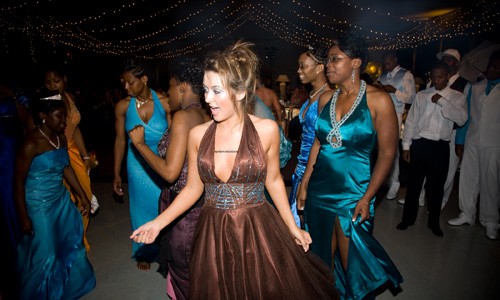Catherine Farquharson was excited to go to her senior prom. It was 2008, the first year that someone like Farquharson, who is white, would be able to attend the prom with her boyfriend, who is black. Charleston High School was about to hold its first integrated prom. "A few kids in our town are changing a little piece of the world," she said.
Farquharson is one of the kids featured in the gripping 2009 documentary Prom Night in Mississippi, which will be screened on Thursday, February 9 at Saint Mary's University as part of Moving Beyond Prejudice, a two-day symposium on race and film. Hosted by the Atlantic Filmmakers' Co-operative, the event will feature a workshop on prejudice and diversity and a master class on documentary filmmaking.
For Paul Saltzman, filming Prom Night in Mississippi was a homecoming. In 1965, when Saltzman was 20, he decided to travel to Mississippi to help with voter registration. He faced many challenges, including a few nights in jail. "I was young and I thought it was something I needed to do," he said. "I was more afraid of Prom Night than any other film I made."
The Mississippi high school originally began the segregated proms in 1970, after allowing black students to attend the predominately white school. Capturing its prom reintergration began by accident. Saltzman was busy filming a documentary about race through interviews with Morgan Freeman. During the last day of shooting, one of Saltzman's researchers stumbled across information about the segregated proms. Freeman had made an offer to Charleston High School in the 1990s to pay for the prom, provided that the event was fully integrated, and the school refused. Saltzman approached Freeman to make the offer again and this time it worked. "We knew the fear was not from the kids but the parents," says Saltzman. "They were afraid to reverse what they had always done. I knew the kids would be open to change.
"Moving beyond prejudice is not as difficult as people think," he adds. "People need to consider their own prejudice. We need to reflect on how we think and feel."
Since 2009, Saltzman has screened the film across North America at high schools and universities. Participants have a Q & A with Saltzman followed by the audience sharing its experiences. "The film is a door-opener on having the discussion about race," says Saltzman. "There is a universality to prejudice. It's shame-based behaviour, regardless of race or class."
As part of the symposium, Saltzman will give a full-day intensive workshop on documentary filmmaking. He's produced more than 75 documentaries including 250 productions in film and television.
"Documentaries are an underappreciated genre of film," says Darrel Varga, the Canada research chair in contemporary film and media studies at the Nova Scotia College of Art and Design, and one of the organizers of the event. "Arguably Canadians created documentary filmmaking. We want to celebrate documentaries and reach new audiences through different venues."
What is unique about Prom Night is the simplicity in its message. The film has attracted the attention of high school students, CEOs and politicians. Regardless of the audience, Saltzman sees the same reaction from each audience---hope.
"The greatest gift we can give to others is to give someone else our attention," says Saltzman. "Sharing is the healing process."
Prom Night in Mississippi, 7pm, Thursday, February 9, followed by the workshop, Saint Mary’s University, Scotiabank Conference Theatre, 923 Robie St, Admission is free.
Documentary Filmmaking master class, Friday, February 10, 10am-2pm, NSCAD Film School, 1649 Brunswick Street, to register, call 405-4474















